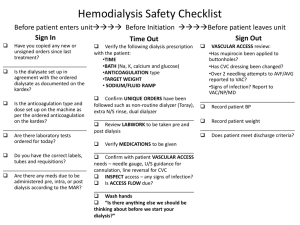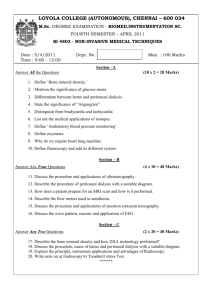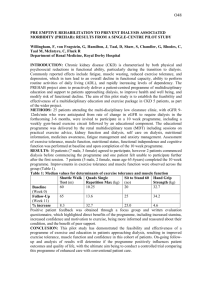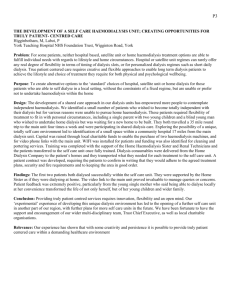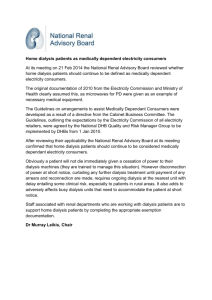first department of internal medicine, ahepa university hospital
advertisement
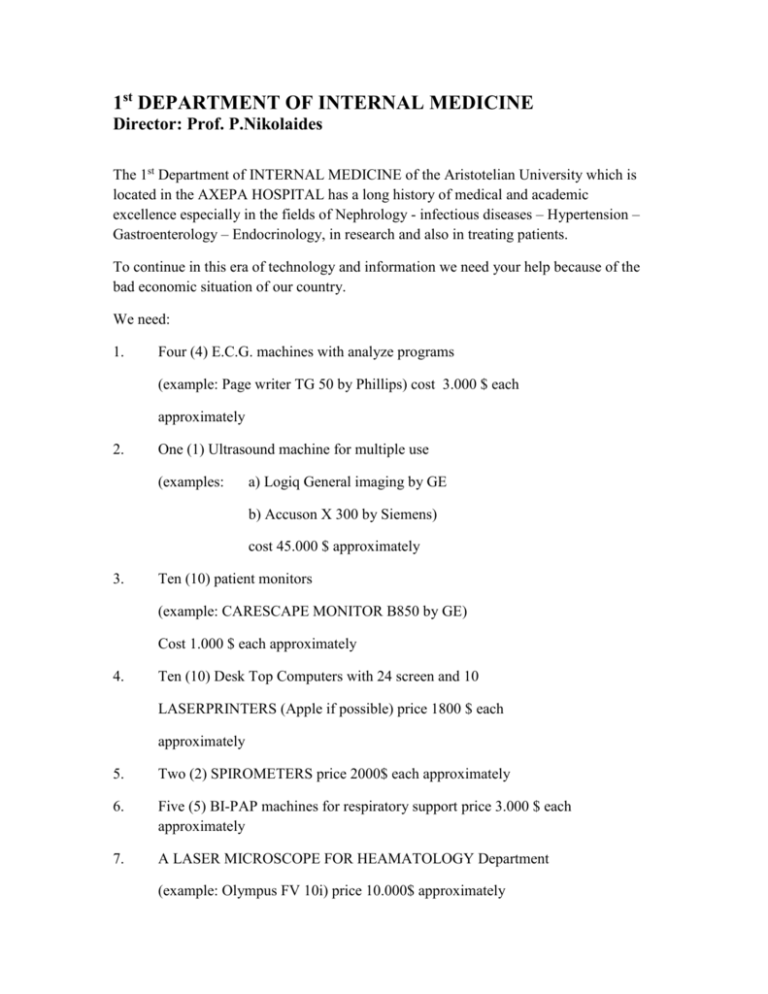
1st DEPARTMENT OF INTERNAL MEDICINE Director: Prof. P.Nikolaides The 1st Department of INTERNAL MEDICINE of the Aristotelian University which is located in the AXEPA HOSPITAL has a long history of medical and academic excellence especially in the fields of Nephrology - infectious diseases – Hypertension – Gastroenterology – Endocrinology, in research and also in treating patients. To continue in this era of technology and information we need your help because of the bad economic situation of our country. We need: 1. Four (4) E.C.G. machines with analyze programs (example: Page writer TG 50 by Phillips) cost 3.000 $ each approximately 2. One (1) Ultrasound machine for multiple use (examples: a) Logiq General imaging by GE b) Accuson X 300 by Siemens) cost 45.000 $ approximately 3. Ten (10) patient monitors (example: CARESCAPE MONITOR B850 by GE) Cost 1.000 $ each approximately 4. Ten (10) Desk Top Computers with 24 screen and 10 LASERPRINTERS (Apple if possible) price 1800 $ each approximately 5. Two (2) SPIROMETERS price 2000$ each approximately 6. Five (5) BI-PAP machines for respiratory support price 3.000 $ each approximately 7. A LASER MICROSCOPE FOR HEAMATOLOGY Department (example: Olympus FV 10i) price 10.000$ approximately 8. a) ENDOSCOPIC ULTRA SOUND (example: GF UCT 180) b) ENDOSCOPIC SYSTEM (example: EXERA III 190 Olympus) price 230.000 $ approximately 9. One (1) GAS analyzer (price 5.000 $ approximately) Dialysis Department, 1st Department of Internal Medicine The dialysis department of the AHEPA University Hospital is one of the leading dialysis departments in Greece. It offers all types of haemodialysis (e.g. conventional haemodialysis, hemodiafiltration, online hemodiafiltration, short daily hemodialysis etc.) as well as Peritoneal Dialysis. Plasma exchange therapies and LDL-apheresis are also provided. Outpatient renal and hypertension clinics run on a daily schedule. The department has been recently completely renovated and hosts 20 modern dialysis machines. It is equipped with flat screen TVs and is fully air-conditioned. The haemodialysis chairs are new and electrically adjustable offering maximum comfort to the patient. We serve 70 long-term haemodialysis patients in three shifts daily and provide first class dialysis and patient-centred care. 90% of our patients achieve a Kt/V of 1.2 or better and the vast majority achieve the minimum recommended levels for haemoglobin and albumin. We have the ability to admit patients at any moment in the Nephrology Department. Our staff consists of 7 fellows and 4 consultants together with 5 nephrologists holding academic positions. One fellow and one staff nephrologist are always on duty on a 24 hour basis. Our doctors are very well trained in Greece and in many European and US centres. They have published a great number of papers in major nephrology journals and are leading experts in the field of Dialysis and Hypertension (among others P. Nikolaidis, N. Dombros, A. Lasaridis, V. Liakopoulos and P. Sarafidis). The nursing staff is experienced and well trained. One dialysis nurse is responsible for 3 patients in every shift. All our doctors and most of our nurses are English speaking. The department is collaborating with a renal dietician and a social worker and runs a famous in-dialysis exercise program. Our Peritoneal Dialysis program is the first organized program in Greece and is well renowned nationally and internationally. It has been founded in collaboration with the Toronto Western Hospital were the late Dr Dimitrios Oreopoulos established Peritoneal Dialysis as a feasible dialysis modality in the 1970’s. Four of our doctors (N. Dombros, P. Nikolaidis, E. Balaskas and V. Liakopoulos) have been trained in Toronto and have transferred their knowledge and experience in the AHEPA hospital. We offer both CAPD and all forms of APD and handle all major PD systems (Baxter, Fresenius and Bieffe Medital). Patients with end stage renal failure are a special population. Due to the nature of their disease, these individuals suffer from life threatening electrolyte and acid base disorders, especially hyperkalemia and metabolic acidosis. Defining these parameters is an urgent situation. It is of notice that the achievement of acid base balance in our patients is an additional quality marker of hemodialysis and should be regularly evaluated in all of our patients. For all these reasons, the presence of an arterial blood gas analyser inside the dialysis department is mandatory in order to save valuable time (the results can become available in less than 2 minutes). The analyser should also provide serum lactate measurements. Central venous catheter placement is a routine medical procedure in every dialysis department but it is not free of complications. According to published data, ultrasound guided central venous cannulation minimizes complications and duration of the procedure. Furthermore, Doppler ultrasonography is a valuable tool in both preoperative planning of construction of a vascular access for hemodialysis and postoperative dialysis access surveillance (native autologous arteriovenous fistulae and arteriovenous grafts). Therefore, a portable colour Doppler ultrasound device with a linear high frequency transducer for optimal vessel imaging is an essential tool in the management of vascular access issues. It must be noticed that there is extended experience in the use of such a device by the units’ medical personnel. This device could be helpful in performing kidney biopsies as well. A different (curved) transducer with a biopsy needle guide will be needed. Performing biopsies under ultrasound guidance will improve accuracy and minimize complications of this procedure. Over 100 kidney biopsies are performed in our department. Several clinical trials are being performed in our department including dialysis patients of our unit. These trials require blood samples from these patients who should be stored in a minus 80 degrees Celsius freezer in order to be properly preserved and used in the future. To sum up, the presence of 1. An arterial blood gas analyser 2. A portable colour Doppler ultrasound device with a linear high frequency transducer and a curved transducer for abdominal ultrasound with a biopsy needle guide. 3. A minus 80 degrees Celsius freezer are essential for our dialysis unit in order to provide high dialysis quality services and perform up-to-date clinical and laboratory research.
